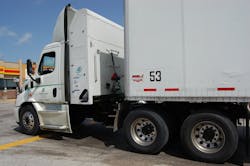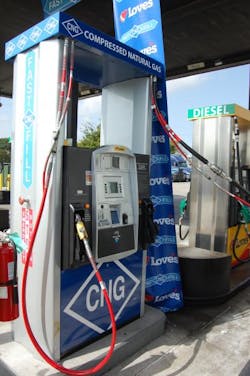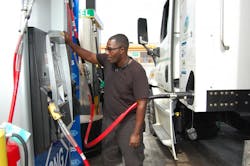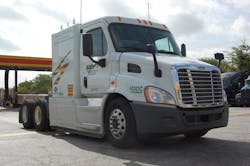Natural gas and climate change: problems in alternative power paradise?
For some time now, natural gas has been the alternative power darling, praised for its many benefits from domestic availability and lower cost to its lower carbon dioxide (CO2) emission levels as compared to diesel. Now, however, a new study released today by the Environmental Defense Fund (EDF) is raising serious questions about the relative merits of natural gas as a vehicle fuel, at least in the short term, when it comes to negatively impacting the climate.
“Natural gas trucks have the potential to reduce overall climate impacts compared to diesel, but only if we clean up the highly potent greenhouse gas emissions from the systems that produce and deliver the fuel,” said Jonathan Camuzeaux, a study author and Senior Economic Analyst at EDF. “Otherwise the net warming effect is actually a negative one for 50 to 90 years afThe “highly potent greenhouse gas” Camuzeaux is talking about is methane, the main ingredient in natural gas. Methane, he noted, has 84 times the warming power of CO2 over a 20-year time frame and it is released into the atmosphere at every step of the natural gas production, delivery and usage process.
What does all that mean? Approximately 6.3 million metric tons of methane escaped from the natural gas value chain in 2013, according to the Environmental Protection Agency’s latest Greenhouse Gas Inventory Report, producing the same 20-year climate impact as about 111 million cars or 140 coal-fired plants. This wasted gas is worth more than $1.42 billion, and is enough to meet the annual needs of about 5 million homes.
Compounding the methane issue is the fact that natural gas engines just aren’t as efficient as diesel engines, at least not right now. The EDF noted that today’s natural gas engines are “typically five to fifteen percent less efficient than diesel engines. Consuming more fuel for each mile traveled reduces the relative CO2 savings.”
All this said, the EDF also stressed the fact that natural gas trucks still “have the potential to provide substantial climate benefits” if the nation can reduce methane emissions and improve natural gas engine efficiency. Several policies are already “in play” they noted “that could improve the climate prospects of natural gas trucks, including upcoming federal fuel efficiency and greenhouse gas standards for heavy trucks and the recently announced federal upstream methane regulations.”
In January of this year when the Obama Administration announced “goal” of reducing methane gas emissions, however, the EDF both praised the intent and offered some cautionary advice. In another EDF article, EDF President Fred Krupp, said: “This is a landmark moment: direct federal regulation of methane is essential, and the administration has set the right goal and launched solid steps to get started. However, we will need a clearer roadmap and more decisive action to ensure the administration tackles the most important part of the problem—emissions from existing wells, pipelines, and facilities. Otherwise, the goal will not be reached. There is no reason to wait ten years to fix a problThe good news here is that the cost to reduce methane leakage truly does appear to be low. The EDF cited a study by the technology consulting firm, ICF International which found that the oil and gas industry could cut methane emissions by 40% for about “one penny per thousand cubic feet of natural gas produced using currently available technologies and practices, such as properly maintaining pumps and other devices and replacing emissions-prone valves.
In today’s press conference, the study authors summarized EDF’s own goals in releasing this report by noting that: “We recognize there is clear potential for natural gas-fueled vehicles. We want to make sure these vehicles live up to that potential in 2020-2025 and going forward. The use of natural gas vehicles is still in its very early stages; it still represents only about one-tenth of one percent of the vehicles on the highway…”
Additional research is underway now to update estimates of methane emissions across the U.S. natural gas system with direct measurements at natural gas production sites and a clearer picture is emerging, according to Ramon Alvarez, one of the EDF co-authors of today’s report. The results of some 16 field studies are expected to be released this year by EDF and its partners in this effort.In the meantime, discussion of the findings of today’s report is just beginning, of course. Natural Gas Vehicles for America (NGV America) offered its own perspective on natural gas as a vehicle fuel today, as well. In a statement released to the press, NGV America president Matthew Godlewski noted that: “This study clearly demonstrates that there is a role for natural gas in addressing climate change. We welcome all credible insight into paths for improving emissions, yet it’s confusing that the Environmental Defense Fund has chosen to conduct and release another study, outside of the cooperative work already underway.
“The NGV industry has consistently been a leader in developing new technologies and using innovation to further reduce emissions and improve air quality,” he added. “Renewable natural gas and near zero emission engines are two examples that will play significant roles in future NGV transportation solutions. Natural gas is the cleanest, most economical and abundant domestic transportation fuel-- delivering immediate benefits on the road to sustainable mobility.
In support of their position, NGV America cited several recent studies making the case that methane leakage has already been significantly reduced at most natural gas production sites. A study cited from the University of Texas at Austin, for example, found that the majority of hydraulically fractured well completions, which were sampled during the study, had equipment in place “that reduces methane emissions by 99 percent. Because of this equipment, methane emissions from well completions are 97 percent lower than calendar year 2011 national emission estimates, released by the Environmental Protection Agency (EPA) in April 2013.”
About the Author
Wendy Leavitt
Wendy Leavitt is a former FleetOwner editor who wrote for the publication from 1998 to 2021.



